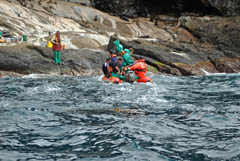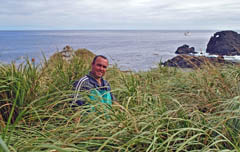This page catalogues the clean-up operations on Nightingale and Inaccessible Islands from 21st March
Start from the beginning or go straight to the Latest News Bulletin of this fast-moving emergency.
|
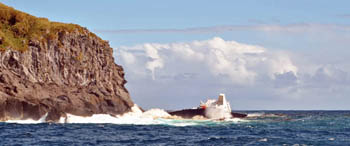
|
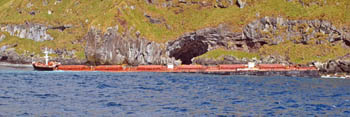
|
Pictures taken by Sean from aboard MV Edinburgh
on Friday 18th March |
They show the two main sections of MS Oliva:
The left picture shows stern section capsized and showing the exposed black hull:
the right picture shows the larger bow and main cargo hold section lying east of Spinners Point close to where it went aground. |
|
Monday 21st March Report from Administrator Sean Burns at 19.30
Clean-Up Phase Begins as Tug Arrives
The tug Smit Amandla arrived at 1515. Chief Islander Ian Lavarello and Administrator Sean Bums went aboard to welcome and the vessel was cleared to work in Tristan waters. Conservation Officer Trevor Glass stayed on board to travel over to Nightingale Island with the on-board team. Trevor will remain on board liaising with the vessel and in particular seabird specialist Estelle van der Merwe who is on board to offer environmental advice. Sean adds 'It's a relief to see them and we look forward to their initial assessment of what to do with the wreck in terms of removing the forward section without further leakage of fuel or cargo and what the prognosis is on the impact on the environment.'
The conservation team are doing a marvellous job cleaning up the penguins and reported that the penguins are now taking water from dishes, which is a good sign. Trevor also reports that there is now little sign of oil on the surface of the sea, which is good news. The focus now will be to assess how much is ashore and how we clean it up. We just hope the salvage team can remove the wreck safely.
A team are now preparing to go over to Inaccessible as soon as the weather allows. They will then start to clean up and contain the penguins over there
|
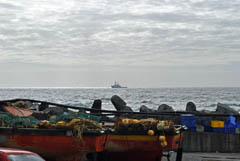
|
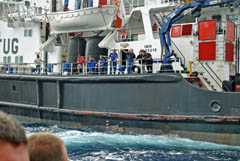
|
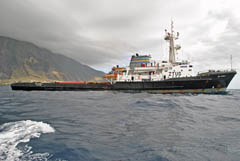
|
|
|
|
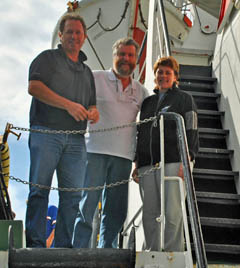
|
Photos from Sean Burns taken on Monday 21st March show:
Top Left and Top Right: The tug Smit Amandla which arrived at Tristan da Cunha 15.15 and then left to begin the clean-up on Nightingale Island
Top centre: Staff aboard Smit Amandla
Left: (left to right)
Captain Nicholas Sloane - P&I Representative (GARD)
Captain Ralph Laing - Salvage Master
Estelle Van der Merwe - Environmental Adviser / Seabird Specialist
|
|
Monday 21st March
Nightingale Oil dissipated : Penguin clean-up progress
The salvage tug Smit Amandla reached the wreck site of MS Oliva on Nightingale Island yesterday afternoon. The Environmental Assessor aboard Estelle van der Merwe reports that no oil is on the surface around the wreck site. Working with Ocean Satellite Imaging Systems she estimates that up to 20 000 oiled penguins may be present. |
Tuesday 22nd March Report from Administrator Sean Burns at 07.35
Fishery Closed
Sean has announced that the fishery around both Nightingale and Inaccessible Islands, pending advice. With all of the oil and pollution around both fishing grounds the island Government did not feel it was responsible to continue fishing and jeopardise this valuable and crucial resource and product. In any case fishing ceased as soon as the MS Oliva ran aground last Wednesday. MV Edinburgh fishes the outer islands of Gough, Inaccessible and Nightingale, whilst Tristan-based local power boats fish the main island. Most of the 2010/11 quota has been caught. |
Tuesday 22nd March
Latest from Nightingale Island
Fuel oil is once more on the sea surface around Nightingale and is still leaking from MS Oliva's hull. The salvage assessors will be inspecting the forward section of the wreck this morning. Treatment of oiled penguins ashore on Nightingale is set to start today. Meanwhile efforts to secure a second vessel to take out out an experienced and fully-equipped oiled penguin-cleaning team are still proceeding in Cape Town.
Clean Tristan Penguins
Tristan Police Officer Conrad Glass reported today that a check by the Police RIB around the main island has revealed that the moulting Rockhoppers around the south of Tristan da Cunha were all clean and there was no evidence around Tristan of any oil pollution. Conrad is famous worldwide as the author of the book ‘Rockhopper Copper’ which is now available in its 2nd edition.
|
Wednesday 23rd March
09.30 Latest report one week after MS Oliva went aground on Nightingale Island
An oiled penguin rehabilitation team is now waiting in Cape Town for transport to the Tristan and has been put together by the SANCCOB Foundation (Foundation for the Conservation of Coastal Birds) which is an internationally recognised leader in seabird rehabilitation with much experience of successfully cleaning oiled African Penguins Spheniscus demersus in sometimes very large numbers. SANCCOB has also occasionally attempted rehabilitating other seabird species, including ACAP-listed albatrosses and giant petrels.
The IOOPF International Tanker Owners Pollution Federation is providing technical advice to the oil spill response. ITOPF is a not-for-profit organisation established on behalf of the world's ship owners to promote an effective response to marine spills of oil, chemicals and other hazardous substances.
We expect news of the ship to be commissioned to transport the rehabilitation team, other key workers and their equipment soon. The ship will then have to face the long 2800km+ sea journey. This trip will take a minimum of four days for a ship (like the tug Smit Amandla) that can do over 20knots, but the regular scheduled vessels (eg MV Edinburgh) take six days. The extreme isolation of the Tristan da Cunha Islands (Tristan is the world’s most isolated community) mean that the instant response to pollution emergencies typical of other incidents elsewhere is impossible. There is no airport on Tristan da Cunha, and no land suitable to build one, even if it was economically viable. Tristan is beyond the reach of helicopters and light planes which may land on other ad hoc sites.
Meanwhile the Tristan Conservation Department is working with Estelle van der Merwe on Nightingale to deal with oiled penguins there and we hope the earlier estimate of 20,000 penguins effected proves to be too high. Sean Burns reports that The Tristan inshore vessel 'Wave Dancer' plans to circumnavigate Inaccessible and Nightingale Islands today and we aim to publish their assessment of the pollution threat around the two islands later.
|
Wednesday 23rd March Afternoon Update at 15.00
Wreck Situation
Speaking on Radio 5 live on Tuesday evening Administrator Sean Burns spoke of the challenge to get the wreck of the reef off Nightingale's Spinners Point. There is thought to be about 20% of the ship's 1500 tonnes of fuel oil remaining in the vessels' tanks. Sean also spoke of the 'absolute mystery' of why the ship, in good weather conditions and in waters charted for centuries, should have grounded on Nightingale Island in the first place. The disaster would be the subject of an enquiry to determine the extent of human error and / or equipment failure.
MS Oliva Crew safe and well on Tristan
Geraldine Repetto reports that all the 22 crew of MS Oliva are now staying ashore in the Tristan da Cunha settlement (Edinburgh of the Seven Seas), joined recently by the Greek captain who was on board MV Edinburgh for several days. All are well and being provided with full board accommodation in island guests houses or Islanders' homes. There are no hotels on Tristan da Cunha. Islanders have given the crew clothes and they are privileged to be living in the family-orientated safe community which is the most remote in the world.
Sea Bird News from RSPB's Katrine Herrian
From the World Heritage Inaccessible Island
Tristan da Cunha based RSPB Project Worker Katrine Herrian reports that she and co-worker Lourens arrived back from Inaccessible Island on Sunday 20th March where they had been working for a week. Lourens returned there this morning with
Martin Green, Colin Hagan, and John Lavarello to try and contain
un oiled penguins in the two rookeries accessible on foot from Blenden
Hall, Blenden Hall Rookery itself and Warrens Cliff rookery. They will also try to
stabilise oiled birds by giving them fresh water before they are
brought to Tristan.They also have a small fibreglass boat to try and
get round to the other rookeries.
Nightingale Rockhoppers to be brought to Tristan da Cunha today
Head of Tristan's Conservation Department Trevor Glass is planning to bring up to 750 oiled birds back from Nightingale Island to Tristan this
evening on the MV Edinburgh. Katrine and the Tristan-based team are preparing a PWD (Public Works Department) shed ready to
house them.
Other seabirds effected by oil pollution
On Sunday Katrine and the team found an oiled storm petrel on the water just off
Inaccessible and today an oiled Giant Petrel which was unable to fly as it was oiled was seen off the Tristan 1961 volcanic lava flow by fishermen. The first Atlantic Yellow-Nosed Albatross with some oil visible has also been sighted, but so far the main casualties seem to be the Northern Rockhopper Penguins. |
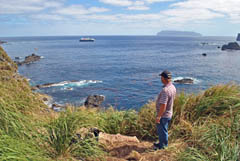
|
Wednesday 23rd March
Left:
Chief Islander Ian Lavarello
looks out from Nightingale
towards Inaccessible Island
Right:
The Tristan Conservation Team at their Nightingale hut. |
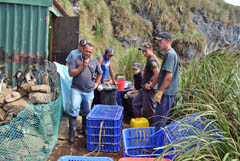
|
|
Thursday 24th March Report based on news from Administrator Sean Burns at 11.00
Fantastic Job by Tristan Conservation Team
Sean praised the fantastic work being done by the Tristan Conservation Department led by Trevor Glass and now containing many other volunteers who have switched from their normal Government or Factory employment to assist in this environmental emergency.
Rockhoppers transferred to Tristan for rehabilitation
A remarkable (and perhaps unique?) wildlife rescue operation is now underway. Working closely with seabird specialist Estelle van der Merwe, the Tristan Conservation Team is carefully collecting oiled Rockhopper Penguins from Nightingale, Inaccessible and Middle Islands and aims to transport them to the main Tristan island where personnel and facilities are available to stabilise them, clean them up and eventually release them back to the ocean. MV Edinburgh arrived from Nightingale Island last night, unloaded a small batch of penguins, and the remainder of the 473 Rockhoppers were brought ashore on Tristan this morning and they are now stored in a cleared PWD shed. Estelle van der Merwe has come ashore on Tristan to co-ordinate this amazing penguin clean up. Unfortunately enough supplies of specialist cleaning fluids are not available and a crucial next step is to confirm a second vessel to depart from Cape Town in the next few days with all the necessary equipment and supplies to clean up the birds, keep them healthy and hopefully return them to the ocean. It will be a race against time.
Pollution Situation
Sean joined a party on the Wave Dancer on Wednesday 23rd March and reports that much of the oil on the sea surface around Nightingale has dissipated and very little remains in the Oliva wreck's tanks. Around the wreck site itself there are visible globules of oil and some thin patches of marine diesel offshore. There are signs of small globules of oil on Inaccessible's World Heritage site beaches and the team there (see report above yesterday) is both preventing unaffected birds from going to sea (where they would face oiling damage) and also holding oiled birds ready for transport to Tristan when this can be arranged. Luckily sea conditions are presently good and even allowed access to Middle or Alex Island which holds the largest Rockhopper Penguin Rookeries in the group and is very tricky to get to.
MS Oliva Wreck to be left to break up
Perhaps this morning's main headline is that the remains of the MS Oliva, presently lying in two main sections as shown vividly in the images at the top of this page, cannot be salvaged and will be allowed to break up. As the wreck is exposed to the prevailing north-west winds the Salvage Master believes the 75,300 tonne vessel with break up readily and its constituent parts soon be consigned to the surrounding ocean depths. There will be those who visit historical wrecks around other coastlines, visible for decades, who may the sceptical about this. Time will tell. Certainly the early optimism that the grounded ship could be pulled off and re floated only a week ago has long since gone. The soya beans aboard are also now evident in the local seas in what Sean describes as a 'soya milk'. Its effect on the local ecosystem has yet to be assessed. As a food source it will undoubtedly be eaten, and the knock-on effect of this sudden and abundant new source on the fragile Nightingale marine environment will be interesting to study.
Oliva Crew entering into village life
The Greek captain and 21 Filipino crew of MS Oliva are now familiar faces in the Tristan da Cunha village of Edinburgh of the Seven Seas (locals hardly ever use this term for what is always known as the settlement or village as no one lives anywhere else!). Sean reports that many were helping to harvest and tend the Islanders 'Potato Patches on Wednesday. Though the crew may bear a heavy responsibility for this crisis, the Islanders' natural warmth and hospitality will mean they will be looked after whilst they are ashore. We hope to publish pictures and reports of their stay soon. We now carry a third page concentrating on the Tristan back-up operation which includes a photograph of the crew. See MS Oliva Tristan Diary
|
Saturday 26th March - Attempt at rescuing penguins from the largest rookery today
Intrepid oiled penguin rescue from from Alex or Middle Island
Alex Island contains the largest Rockhopper Penguin Rookery and it is understood that its rugged coastline is also the worst effected by oil pollution. Landing is very difficult and in some seasons counts cannot be arranged. Katrine Herian reports that today the Tristan Conservation Department is going ashore on Alex Island to transfer as many oiled penguins as possible to MV Edinburgh for onward transit to Tristan for rehabilitation. It is crucial that the current good landing weather is maximised as these exercises are dangerous. Islanders work in small open boats making landings often on steep slippery bare rock landings, and will be impossible when the swell increases. Indeed Tristan's own Calshot Harbour is more often closed than open throughout the year. |
Saturday 26th March - Report from RSPB Project Officer Katrine Herian 19.00
Swells prevent Saturday penguin transit
Heavy swells prevented any oiled penguins corralled on Nightingale from being taken to Tristan today on the fishing vessel MV Edinburgh.
Nightingale Pollution Update - Fur Seals found dead
This afternoon, Conservation Officer Trevor Glass on board MV Edinburgh reported heavy crude oil and lots of tar balls on the water 4.5 miles south of Nightingale. On Alex (Middle) Island at the polluted tidal pool by the landing rocks, many of the recently moulted penguins are leaving the rookery to access the sea by this route and will be
getting oiled. The total number of breeding pairs are 67 000 but it is not known how many are still left. It is known, however that there are several thousand left and possibly tens of thousands. The conservation team have been unable to see the entire coastline from the land and there could be oiled areas not visible from the sea. Two Sub-Antarctic Fur Seals were reported
dead this morning in the polluted tidal pool.
Latest Inaccessible News
On Inaccessible, a World Heritage Site, Lourens Malan reported the team had 300 oiled penguins waiting to be collected from the Warren's Cliff rookery with a further 800-1000 un oiled penguins that have been corralled to prevent them from entering the sea over oiled rocks below the colony. Heavy swell was churning up the thick oil among the boulders on the beach below the Warrens Cliff colony resulting in oily surf that any penguins heading for sea had to pass through. Lourens estimated that about one third of the penguins coming out of the Warren's Cliff rookery onto the beach and into the corral the team constructed, were covered in oil. He reported that hundreds and potentially thousands of recently moulted penguins were coming down from the rookery to go to sea and getting oiled as they have to pass through oil to enter the ocean.
Disaster spreads to land species as Inaccessible Island Rails are found dead
He also reported seals heavily covered in oil and two dead Inaccessible Rails in the tussock grass near the shore. The Inaccessible Rail is the smallest flightless bird in the world and is endemic to Inaccessible. It can be seen near the shore darting among the tussock grass and boulder pebbles foraging for invertebrates.
Many penguin rookeries still to check
Priority is to get to all the rookeries on Nightingale and Inaccessible that have been impossible to visit yet due to bad weather conditions. Many of these rookeries are only accessible by small RIB, weather permitting. Seven out of the nine rookeries on Inaccessible Island are yet to be visited. This will be done as a matter of priority as soon as weather permits.
Second tug preparing to leave Cape Town - but won't arrive for another week
The tug 'Singapore' is scheduled to leave Cape Town on the evening of Monday 28th bringing five SANCCOB staff, equipment and materials for the washing and rehabilitation of the penguins. The vessel will take five days to get
to Tristan and is due to arrive on Saturday 2nd April. The delay in the arrival of a second vessel emphasises Tristan da Cunha's extreme isolation. Scheduled vessels take at least six days to reach Tristan, and specialist ships capable of higher speeds are just not immediately available.
|
Sunday 27 th March - Report from RSPB Project Officer Katrine Herrian at 20.00
Nightingale Oliva and pollution update
Tristan Conservation Officer Trevor Glass reported from aboard MV Edinburgh at 08.00 that the oil slick in Petrel Bay was still present. There was no more oil coming from Oliva’s fore or aft sections, but the aft section is now completely submerged. Heavy swells made it difficult to get penguins off Nightingale today. By 14.00 253 penguins had been loaded onto the Edinburgh.
Inaccessible Update
Lourens Malan reported that it was a cold day on Inaccessible Island with wind and driving rain. However the team were still out working at Warren's Cliff rookery, a half hour walk over a boulder beach from the hut at Blenden Hall where they are staying. The team have now corralled over 1000 unoiled penguins. Team member Martin Green, celebrated his 40th birthday today.
The Inaccessible team’s small dinghy has been holed and is out of action so they are unable to access other island rookeries. The team has requested fibreglass matting and resin to repair it. The fisheries patrol boat 'Wave Dancer' will be on standby on Monday 28 th March to take two extra islanders over to join the team and take additional supplies, including resin to repair the dinghy. Environmental Advisor Estelle van der Merwe will accompany them and advise on a planned operation to take unoiled penguins aboard MV Edinburgh and then release out at sea beyond the polluted waters. Estelle is consulting with RSPB's Richard Cuthbert on the release location.
|
Monday 28th March - Update from Tina Glass on Tristan at 14.00
Conservation Teams on the outer islands
Tina's husband and Head of Conservation Department Trevor Glass is now based on Tristan and those who have been following the developing story of the Oliva clean-up operation will be interested to know the names of the two teams presently based on the outer islands.
Nightingale Island Team:
Simon Glass , Matthew Green, Rodney Green, Jerry Green, Wayne Swain,
Eugene Repetto, Patrick Green, George Swain, Julian Swain
Inaccessible Island Team:
Lourens Malan , Martin Green, John Lavarello, Colin Hagan |
Monday 28th March Report from RSPB Project Officer Katrine Herrian
Nightingale Update : Oliva hatches open to the elements; 500 oiled penguins ready for trip to rehab on Tristan
At 11.30am this morning the Edinburgh reported heavy seas and swell running. All the hatches of the MV Oliva have now come open.
The team on Nightingale (see note above from Tina Glass of their names) have been extending the fence around the oiled penguins. Simon Glass reported they had about 500 oiled penguins ready to be transported the 25 miles by sea to Tristan.
Inaccessible Update: Team starting to feed penguins
Lourens Malan reported that the team on Inaccessible had fed their first penguin today with fish caught on a line from the beach. They were requesting more hand lines. The team spent much of the day repairing fences at the two rookeries where penguins were corralled at Blenden Hall and Warren’s Cliff. Seals had broken through sections of the fences allowing some of the corralled penguins to escape.
Bad weather postpones penguin transfer to Tristan rehab
Bad weather has prevented any boats from getting to Inaccessible to collect penguins. They still have 1400 penguins corralled at Warren’s Cliff, 300 of which are oiled, the rest unoiled. The team are corralling unoiled penguins to prevent them going over the oiled shoreline just below where penguins from this colony enter the sea.
Wave Dancer & Edinburgh still on standby to get to Inaccessible at the first possible opportunity to collect penguins, take over extra supplies and further team members, as well as Environmental Advisor Estelle van der Merwe. |
Tuesday 29th March Report from RSPB Project Officer Katrine Herian at 20.00
Bad weather hampers clean-up efforts
Tuesday was another bitingly cold day on Tristan with strong winds and 5 metre swells. Bad weather prevented landing at either Nightingale or Inaccessible. MV Edinburgh took 5.5 hours to make the 25 mile journey between Nightingale and Tristan, a trip which normally takes around 2.5 hours. The tug Singapore left Cape Town today with the SANCOB team and equipment on board, delayed by fog the previous evening.
Nightingale News
At 07.00 Simon Glass reported a heavy swell running at the landing rock. The team spent the day feeding the very weak penguins with 60ml each of Hill a/d. Due to bad weather they couldn't fish today to feed the stronger penguins but will try again tomorrow.
Inaccessible Latest
After seeking advice the team regrettably released 150 oiled birds they were holding in the corral at Warren’s Cliff in order to focus their resources on the unoiled penguins. The oiled penguins had been held for more than 5 days as neither the Edinburgh nor local RIBs have been able to get over to the island due to bad weather and swells at the landing beach and heavy seas had dispersed some of the oil at the landing beach below the colony. They are still holding 1400 unoiled penguins
at Warren's Cliff. |
Wednesday 30th March Report from Marina Burns
Nightingale Update
It has been reported today that the west landing is still covered in oil. 700 penguins are being transported by MV Edinburgh from Nightingale to Tristan later this afternoon. The Edinburgh will also transport most of the Nightingale-based conservation team, leaving Matthew and Wayne will remain on Nightingale to continue monitoring the situation there and taking care of the remaining oiled penguins, which will be transported to Tristan as soon as weather permits.
Middle Island Latest
Middle Island is also still badly affected. Approximately 8000 penguins are still on the island. It is hoped that as soon as the penguins have been rescued from Inaccessible, the team can assist further here.
World Heritage Site of Inaccessible Island a priority
The weather is looking good on Friday 31st March to send a sizable team over to Inaccessible to assist in the rescue of as many oiled and unoiled penguins as possible. The team will include Environmental Advisor Estelle van der Merwe, Spill Auditor Nick Sloane, Conservation Officer Trevor Glass, members of the Nightingale team and divers from the tug Smit Amandla. Protecting the World Heritage Site of Inaccessible Island is a top priority for the conservation teams. |
Thursday 31st March Report from RSPB Project Officer Katrine Herian at 18.00
Nightingale Report
Environmental Advisor Estelle van der Merwe went over to Nightingale Island today and reported that most of the penguins were in a good condition as they have been stabilised by the team on Nightingale. The rehab team on Tristan are on standby to receive 539 penguins to be transported there this evening. There were six moderately oiled penguins found dead in the water at West Landing, and 150-200 oiled penguins on the rocks there.
Inaccessible lives up to its name
Due to bad weather no landings were possible at Inaccessible again today. Lourens Malan reported that the team had fed around 500 penguins, and that they were catching more fish. For the first time the team walked the beaches west from Blenden Hall round to Dirleton Point during which they counted 300 oiled penguins along this stretch of shoreline.
|
Photos from Sean Burns
of Nightingale and Alex or Middle Island on Saturday 2nd April 2011 |
|
Left:
Landing at the rock on Nightingale Island
Right:
Tristan Conservation Team member Simon Glass checking a penguin rookery amidst the tussock grass which covers most on Nightingale and makes walking around very slow.
|
|
Right:
The sea between Middle Island and Spinners Point
is smothered
with a type of 'soya milk'
as MS Oliva's cargo continues to wash out
of the now open holds.
The remains of the large forward section can be seen (just)
wrecked on the reef off Spinners Point,
but the bow section is now below water to the right of the point (far right). |
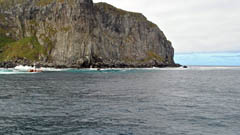
|
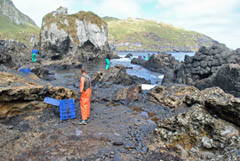
|
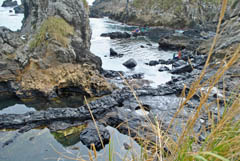
|
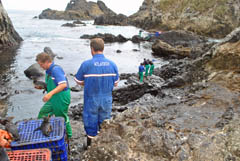
|
Middle of Alex Island is home to The Tristan Islands' largest Northern Rockhopper Penguin Rookery and is the worst polluted area as oil from MS Oliva drifted immediately across to this cove which is the main landing & also tragically the access route for the rockhoppers.
Pictures show the oil-smothered foreshore and the Tristan Conservation Team starting to clear up the foreshore. |
|
Sunday 3rd April Report from Tristan Administrator Sean Burns
Pollution Assessment
Sean was able to travel over to the outer islands on Saturday 2nd April. He reports that Alex or Middle Island is by far the worst polluted area seen, but vast areas of the islands have not yet been visited. With the way the wreck is lying and taking into account the way the wind has been moving since the ship ran aground, it is not surprising that this area is badly hit. The ‘landing’, situated opposite the Western Landing on Nightingale is coated in thick oil. Sean saw oil in the sea around the islands with the heaviest concentration on Nightingale around Petrel Bay. Blenden Hall on Inaccessible still has a slick of diesel and heavy fuel oil, and some heavy oil in the kelp around Nightingale and Inaccessible islands.
Rookeries almost empty as moulting season finishes
Simon and the team removed the last of the birds and apart from a few stragglers the rookery above this area is now more or less empty. The other rookeries on Nightingale are clean and most of the birds have now left. Whether or not they survived we do not know. An assessment of how many birds have survived cannot be made until the penguins return to begin breeding in August.
|
Wednesday 6th April Report from RSPB Project Officer Katrine Herian
Outer islands oil pollution assessment
Dr. Mark Whittington (of ITOPF) , and Mr. Jean-Luc Dardidon (of Le Floch), arriving aboard the tug Singapore, have visited Middle & Nightingale Islands to assess the residual oil remaining in the bays and on the rocks after the OLIVA grounded on the 16 th March. A plan shall shortly be formalised to deal with the remaining oil, and to prevent further impact on the penguin and bird colonies. |
Report from RSPB Project Officer Katrine Herian Thursday 7th April
Nightingale and Inaccessible Conservation Update
There are now small conservation teams based on Nightingale and Inaccessible Islands as the Northern Rockhopper penguins complete their moult and return to sea whilst most oiled birds have been transferred to rehabilitation on Tristan da Cunha.
The team of three on Nightingale are monitoring the rodent bait stations every two days just in case there has been any infestation from MS Oliva and they are holding 63 oiled penguins, to be transferred to Tristan as soon as the weather allows. The team of two on the World Heritage Site of Inaccessible Island are holding only one oiled penguin straggler which will be transported to Tristan soon.
Katrine has received no new reports of seal or seabird casualties, which is very good news.
|
Monday 11th April Report from RSPB Project Officer Katrine Herian
Last oiled penguins from Nightingale Island enter Tristan rehab
On Sunday 10th April the last 56 oiled penguins left Nightingale Island bound for Tristan on the tug Singapore. The Nightingale team reported that no further oiled birds had been seen on Alex Island, only 1 clean penguin and 2 dead.
Arrival of Ivan Papanin Imminent
Tristan awaits the arrival of the Ivan Papanin on Tuesday 12 th April with clean-up materials, equipment and further personnel. Mark Whittington of ITOPF has produced a clean-up plan and the helicopter being brought by the ship will be crucial in accessing sections of coastline on Inaccessible, Nightingale, Middle and Stoltenhoff Islands not yet properly accessed for pollution. |
Tuesday 19th April Report from Tristan Administrator Sean Burns
Visit to worst-affected Middle Island
Sean visited Middle Island on Sunday 17 th April to see the good progress being made with the clearance of oil in what has so far been found to be the worst affected area.
The ITOPF team, led by Dr Mark Whittington, explained that they were using high pressure hoses of warmed sea water to remove the oil. No detergents or chemicals were being deployed in the process. This was then collected and bagged for return to Cape Town. They are also using booms and what they call 'pompoms' to prevent the oil returning to the marine environment and to soak up the oil. Mark estimated that in the two days they had been working on the clean up, they had removed three tons of oil. I could certainly see a big improvement from my last visit and the island team and divers helping with the project reported that the system appeared effective. Mark said that one challenge was the porous nature of the rock. When the oil is cleaned, there is still some seepage as the volcanic rock acts like a sponge. This was inevitable but the amounts were relatively small.
The purpose of this operation is to clean away the oil and prevent any further damage to seals and birds who populate the area (keeping in mind the penguins have now left their rookery). This, together with the extreme winter weather should break up and clear any oil that remains and Mark was confident that come the spring there would be little, if any, evidence of the spillage.
Hopes that winter storms will clear other oiled beaches
There is still a concern that much of the Nightingale coastline and all of the Inaccessible coastline had still not been closely inspected. It was hoped ITOPF would be able to do this prior to their departure on 23 rd April but if they could not, island teams will do so. Nevertheless it is hoped that the extreme weather and wave action will help break down and remove the oil. Given the geography and the way the oil was moved around from the wreck, Middle Island was always likely to be the most vulnerable area so it is positive that the teams have been able to deploy to the area and concentrate on clearing the oil from this spot.
|
Sean Burns' images taken on 17th April 2011 |
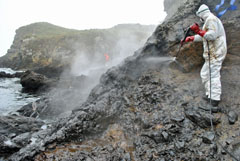
|
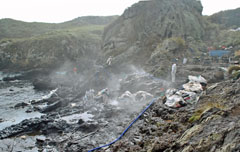
|
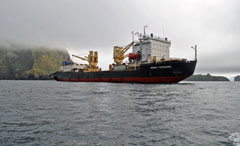
|
Using high pressure hoses to clear oil on Alex or Middle Island |
The ship ‘Ivan Papanin’ |
|
Edited Report from Administrator Sean Burns on 27th April
Nightingale
There is still a team of three on the Island monitoring bait stations for rats, but thankfully no evidence of rodent infestation has been found. A team change over has been postponed due to poor weather. The weather has also delayed a planned inspection of Middle Island to monitor the progress of the weather breaking up and washing away the oil that remains and seeping from the rocks as Sean observed recently.
Inaccessible
It has been impossible to make a landing to carry out a close inspection of the beach at Blenden Hall. It remains a priority to do so asap.
The Oliva Wreck
There has still been no survey of the wreck and therefore confirmation that there is no longer any cargo and lubricants on or around the ship. For example there may be paints and other oils/lubricants on board have yet to be released and dispersed. |
|









